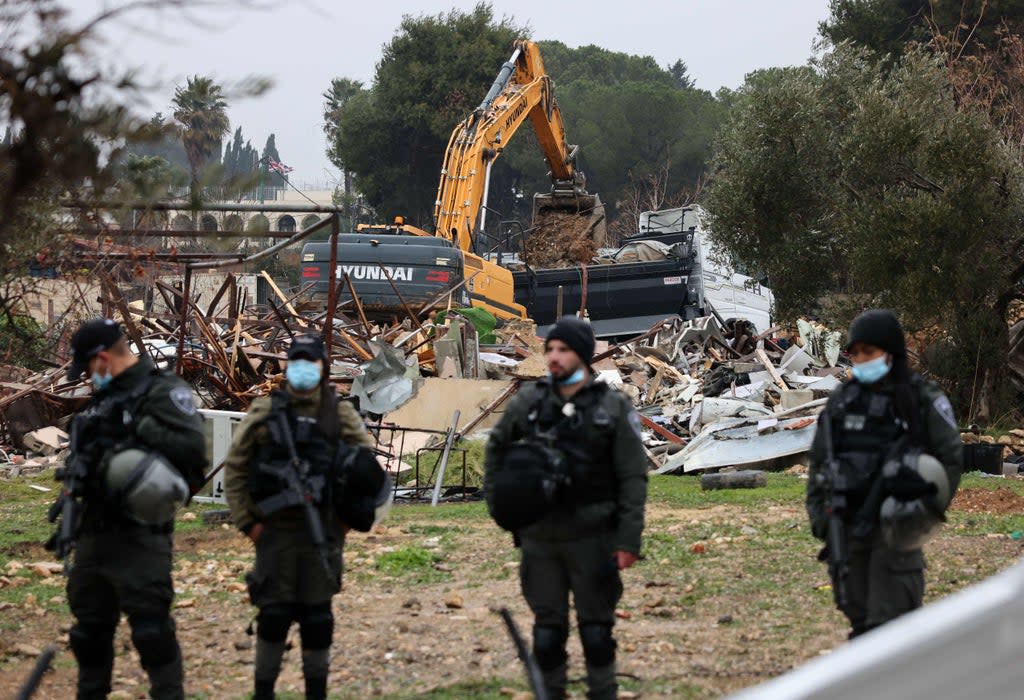Sheikh Jarrah: Israel forcibly evicts Palestinian family from East Jerusalem home

Israeli police have forcibly evicted a Palestinian family from their home in the flashpoint neighbourhood of Sheikh Jarrah in occupied East Jerusalem and later demolished it, in a move rights groups and diplomats decried as illegal under international law.
The family-of-15, including several children, were left homeless in the freezing winter weather after the Israeli security forces demolished the building. It is an area that Israel captured during the 1967 war and then annexed. Sheikh Jarrah is where Israeli authorities have repeatedly forcibly evicted long-term Palestinian residents to make way for Jewish settlers, despite widespread international condemnation.
In this instance, Israeli police and the Jerusalem municipality said the family had been given "countless opportunities" to hand over the land since an evacuation order was served in 2017. The order claims the family were living in “illegal buildings built on grounds designated for a school" for Palestinian children with special needs as well as several kindergartens and other public facilities.
It followed a tense standoff the day before, which had seen members of the Salhiyeh family, who lived there, climb onto the roof of the building and threaten to set gas tanks on fire rather than be forced out.
Witnesses said the security forces moved in under the cover of darkness very early Wednesday, first forcibly removing the family and then demolishing the home with a digger, leaving just mounds of rubble and some belongings.
The Israeli police later said 18 people were arrested for alleged "suspicion of violating a court order, violent fortification and disturbing public order”.
The move was widely slammed by rights groups and diplomats who said it was not only illegal under international law, but also a possible war crime and a major obstacle to peace.
Previous forced evictions have sparked mass protests which last summer helped ignite an 11-day war between Israel and militants in Gaza.
The European Union Delegation to the Palestinians, which joined a group of diplomats that visited the home the afternoon before the demolition, said such evictions “significantly undermine the prospects for peace as well as fuel tensions on the ground”.
Human Rights Watch said the move was a war crime and made the family two-time refugees. HRW said the Salhiyehs had been expelled from their home in Ain Kerem, west of Jerusalem, during the conflict which surrounded the creation of Israel in 1948 but “are barred under Israeli law from reclaiming it”. On Wednesday the family were forced from their home again.
The Norweigan Refugee Council said the move was a clear violation of international law, which prohibits forcible displacement in occupied territory.
“The family have no place to go,” it added in a statement. “Children’s physical and psychological wellbeing is now at risk, having witnessed their home turn into rubble in the dark.”
Palestinian President Mahmoud Abbas also condemned the eviction, calling it a "war crime," and saying that Israel bears full responsibility for its "serious repercussions." He called on the United States to "intervene immediately to halt the continuing Israeli crimes against our people in Jerusalem”.
It was even criticised by some Israeli politicians. Mossi Ras, a parliamentarian for the left-wing Meretz party, tweeted that the police behaved like “thieves in the night” evicting the family into a freezing street.
A lawyer for the Salhiyeh family said they purchased the property before Israel captured east Jerusalem in 1967, and have been living there for over 70 years.
The municipality said the Salhiyehs were squatters who built there illegally in the 1990s and that the land was always zoned for public use. It says the owners will be compensated, including being offered rented accommodation.
"These illegal buildings had been preventing the construction of a school which can benefit the children of the entire Sheikh Jarrah community," the city and police said in a joint statement.
Hagit Ofran, a researcher for the Israeli rights group Peace Now, acknowledged the family had been unable to prove ownership but said it was clear they had lived there for years.
She said the special-needs school could have been built elsewhere, including on a nearby plot given to an ultra-Orthodox Jewish boarding school.

